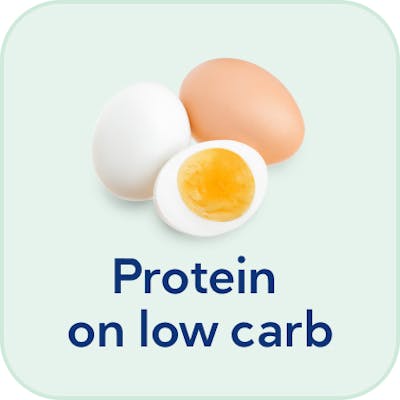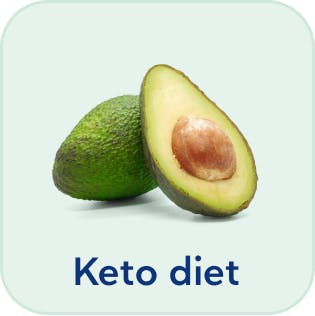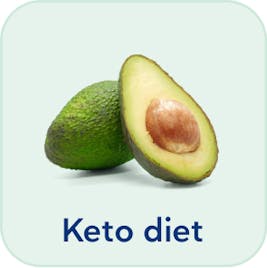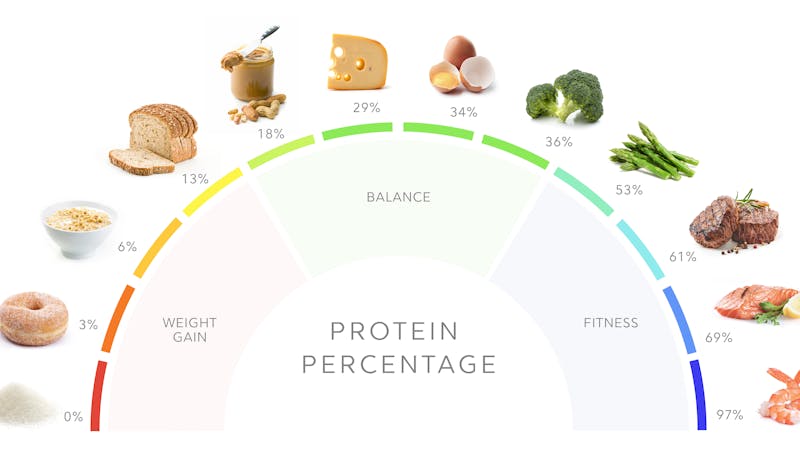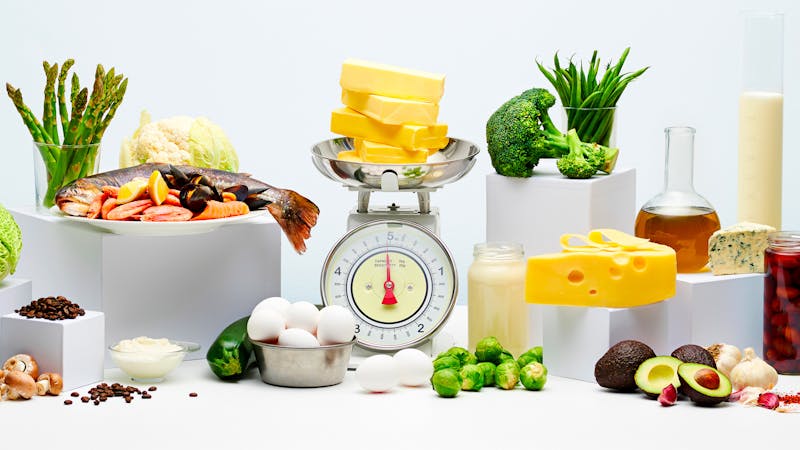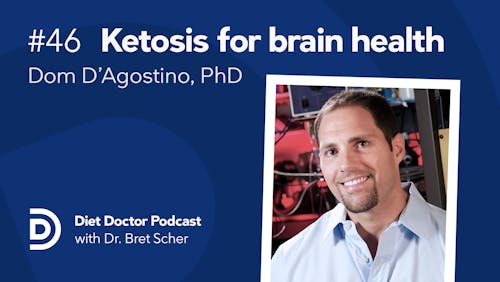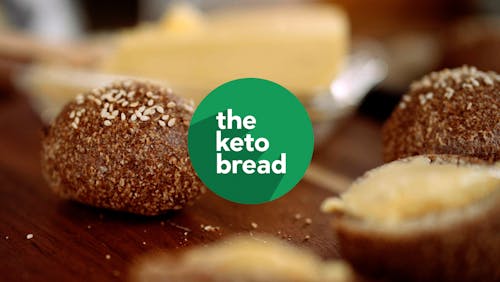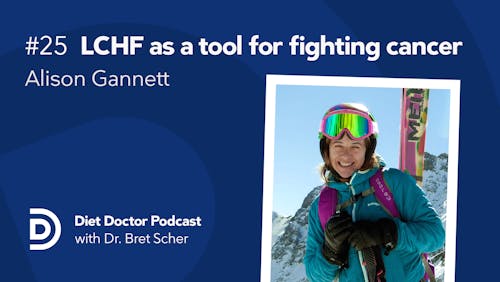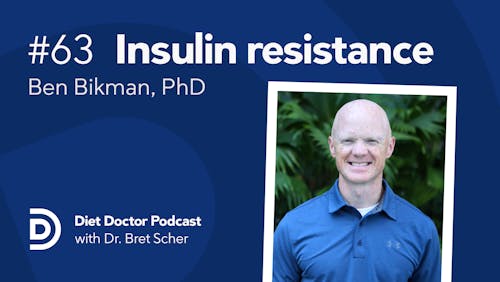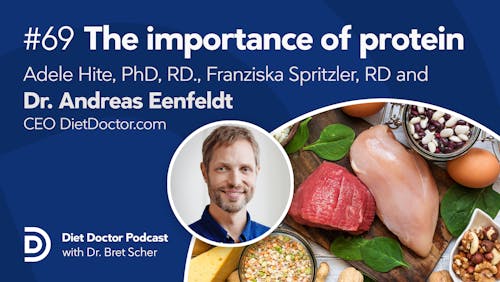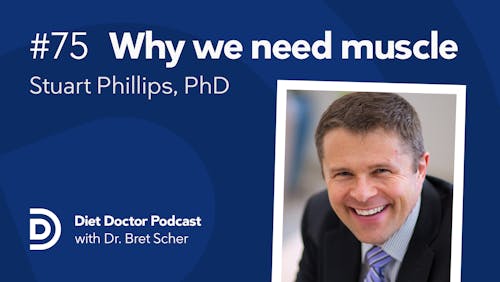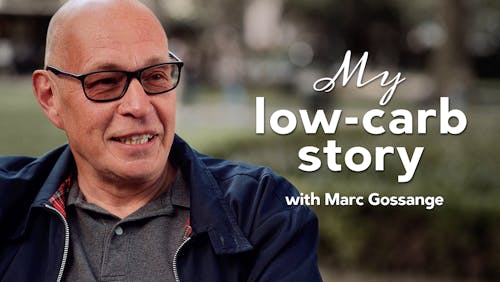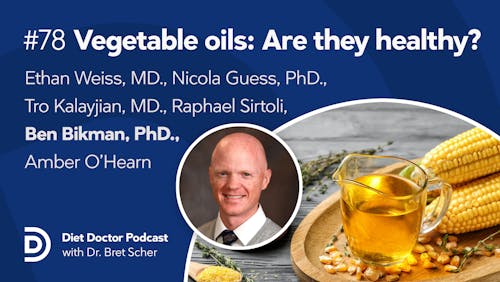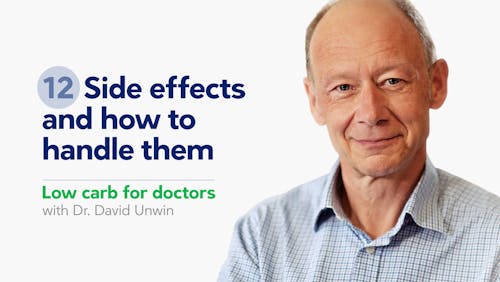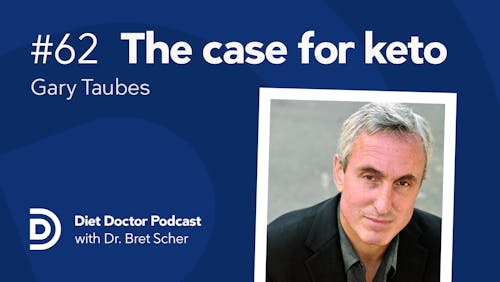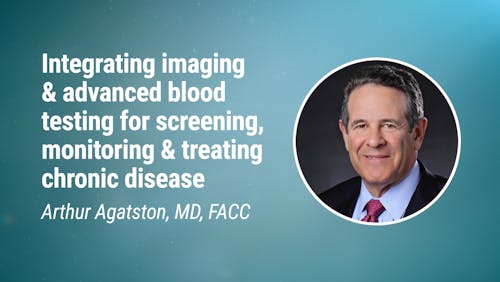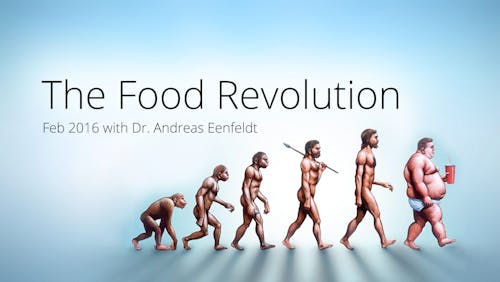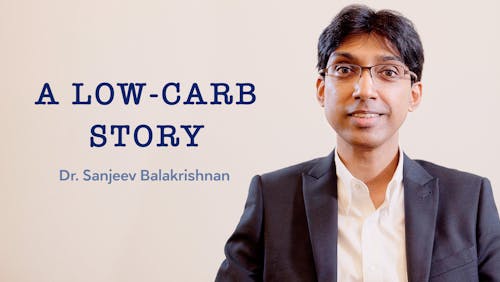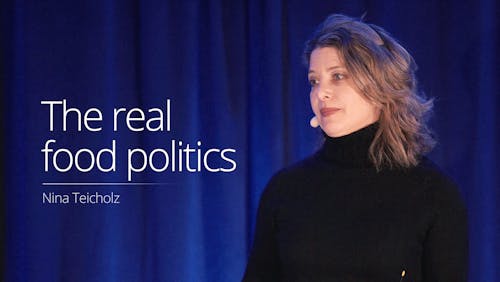Carbs, protein, and fat: What are the best macros for weight loss?
Summary
Most experts agree that the average modern diet contains too many processed carbs, too much processed fat, and insufficient protein.At Diet Doctor, we believe most people will benefit from lowering carbs and increasing protein. Regarding fats, most will also likely benefit from minimizing those that are highly processed, while freely eating the natural fat that comes along with whole-food proteins.
What is the key to long-term weight loss? It is maintaining a calorie deficit (burning more calories than you take in) in a sustainable way that leads to improvements in health and well-being.
While it sounds straightforward, it isn’t always easy. For most people, losing weight isn’t as simple as “trying harder” or having more willpower. This is because the most easily accessible foods are often high in calories, low in nutrition and – when loaded with carbs, fat, and sugar – somewhat addictive.
The temptation is often too much to ask anyone to resist.
Couple hyper-palatable food with your body’s need to get adequate protein and nutrition, and you have the perfect set-up for overeating.
Fortunately, scientific research shows that increasing protein improves weight loss.1 The same goes for lowering carbohydrates.2
But doing both together may be the most effective approach for many people. That would mean eating a range of 5 to 15% carbs, 25 to 35% protein, and 45 to 65% fat.3




Key takeaways
Protein for weight lossUpping your protein is scientifically proven to aid weight loss, improve body composition, and increase satiety. Learn more
How many carbs?
According to many studies, limiting carbs leads to better weight loss — and naturally reduces your appetite and calorie intake. Read more
Should you eat fat?
Despite what you may have heard, eating fat does not by default make you fat. However, for healthy weight loss, you want to be sure to eat the right amount. Learn more
Ideal macros for weight loss
When you lose weight, you want to make sure to do it in a healthy way.
This means mainly losing fat mass without losing much muscle mass. It also means preserving your resting metabolic rate, improving your metabolic health, and eating in a way you enjoy and can sustain long term.
But what are the best percentages of carbohydrate, fat, and protein — often called macronutrients or “macros” — to achieve healthy weight loss? High protein? Low carb? Low fat? High fat?
While each individual might find a different answer, many people will succeed with a high protein, low carb diet.
As stated above, that would mean a range of 5-15% carbs, 25-35% protein, and 45-65% fat (For an 1,800-calorie diet, that equates to around 20 to 70 g carbs, 110 to 160 g protein, and 90 to 130 grams fat).
| For a 1,800-calorie diet | % calories | approximate total grams |
|---|---|---|
| Carbohydrate | 5-15% | 20-70g |
| Protein | 25-35% | 110-160g |
| Fat | 45-65% | 90-130g |





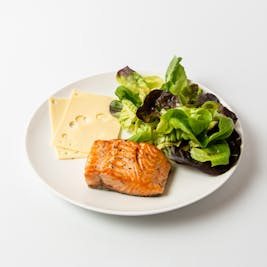









Although eating a high protein, low carb diet is not the only approach, it may be the best starting point. You can then monitor your hunger levels, food enjoyment, and healthy weight loss progress and adjust as needed.
Read on to understand why this is a successful combination for most people and how you can get started with healthy weight loss today.
Or, watch a summary of this guide in video
The worst foods for weight loss
Before we dig into what you should eat, let’s start with the easy part — what you shouldn’t eat. And when we say “easy,” we mean easy to say, but often times, harder to do.
You want to avoid high calorie, low-nutrient foods — especially those that stimulate you to want to eat more. Most of these foods are ultra-processed and combine fat, starches, and sugar.4
But they can also be ultra-processed fats, such as oils or cream, or carbs by themselves, and of course anything with added sugar or high fructose corn syrup like sugar-sweetened beverages.5
Also, don’t forget noncaloric sweeteners. If you are adding noncaloric sweeteners to coffee or tea, that is likely less concerning. But adding them to calorie-containing foods, like desserts or snacks, can lead to overeating.6
High protein for weight loss
Protein may be the most critical macronutrient for weight loss. That may surprise some since much of the discussion around weight loss focuses on reducing carbs or fat.
Within the context of moderate and high carb diets, increasing the amount of protein demonstrates improved weight loss and body composition.7
Improved weight loss and body composition may explain why higher protein diets consistently result in better metabolic health and blood sugar control in people with and without diabetes.8
Studies also show that higher protein diets promote satiety and decrease hunger better than lower protein diets.9
In fact, most of the low carb studies showing better weight loss and improved metabolic health are also higher protein studies. This means the study participants lowered their carbs and increased the percentage of protein in their diets. We will explain more about that in the low carb for weight loss section below.
Other reasons why protein may be beneficial for weight loss
- Protein leverage means that our bodies will seek out food and nutrition until we have reached our innate set point for protein intake.10 Based on the protein leverage hypothesis, eating low protein foods means you’ll overeat calories to get enough protein. Eating high protein foods will do the opposite.
- Studies show that eating protein increases thermogenesis — the amount of energy required to digest and metabolize food. The energy required can be as high as 15% of total daily energy expenditure and is consistently higher with high protein meals.11
- Eating high protein foods helps you avoid the energy-dense, nutrient-poor food that is so easy to overeat. Take a look at our guide to the top protein foods. You aren’t going to find many processed, hyper-palatable foods. That’s a win for protein!
Low carb for weight loss




Why might a low carb diet be more effective than low fat for weight loss? With low carb, people limit hyper-palatable, high carb foods, thereby lowering their insulin levels. They also tend to spontaneously reduce their calorie intake. But one often overlooked feature of these diets is that they also have higher protein percentages than do low fat diets.
Low carb RCTs are also higher protein RCTs
In 29 randomized trials lasting at least 3 months, which measured weight loss and glycemic control on a low carb diet compared to a low fat diet:
- None show low fat was better for weight loss or glucose control.
- Thirteen show combined lower carb AND higher protein were better than the control diet.
- Nine show lower carb and higher protein was equivalent to the control diet.
- Of the seven that controlled for equal protein:
- Three show no difference between low carb and the control diet.
- Four show a benefit to low carb. However, one didn’t specify what participants ate, only what they were told to eat. So it is unclear if they complied or not. And another kept the protein very low at only 64 grams per day.
Because many of the above low carb trials also increased the protein content of the intervention diet, we can’t definitively say that carb reduction led to clinical benefits. Instead, we can say that a lower carb AND higher protein diet is usually better than the comparison diet.
You can read more about these 29 studies in our detailed guide.
One small randomized trial reported that increasing protein appears to have a greater impact on weight loss than carb reduction.13 However, more studies are required to draw a definitive conclusion.
Calories matter
Carbs and fat add calories to your diet. This is not a judgment; it is a fact. You need calories for energy, but you also must remain in a calorie deficit to lose weight.
The key is to find the eating pattern that provides adequate protein and nutrition while keeping you full and satisfied – with the fewest calories. For some, that will be low carb-high fat; for others, low carb-high protein; and still others, whole-foods high carb-low fat.
Summary
As we say at Diet Doctor, “calories count, but you don’t have to count them.” This means it’s ideal if your eating pattern helps you naturally reduce calories, so you don’t have to measure and calculate everything you eat.
Why carbs still matter
As most of the above-mentioned low carb studies increased protein, does that mean carbs don’t matter?
Of course not.
One small study compared a high protein keto diet to a high protein moderate carb diet and found better weight loss along with decreased hunger and calorie intake with the lower carb diet.14 This study suggests that the combination of higher protein and lower carbs might be the most effective approach.
And carbs definitely matter for those who find them easy to overeat or have a hard time controlling them. One study from Harvard reports a 60% carb diet had 43% increased activity in the brain’s reward center compared to a 20% carb diet. The increased brain activity suggests that carbs can have strong addictive characteristics for some.15
The combination of processed carbs and fats is most likely to stimulate your brain in a way that may cause you to overeat and crave more.16
Low carb diets can also lower insulin levels, which allows for easier access to burning fat stores. Although weight loss itself can lower insulin levels, low carb diets likely have a more direct impact on insulin than do other diets.17
Carbs are not “evil” for everyone
Despite evidence that low carb diets are often better for weight loss and blood sugar control than low fat diets, that doesn’t mean carbs are harmful for everyone.
Observations from the Blue Zone populations — regions where people live into their 90s and 100s more often than the general population — show that specific populations can lead healthy lives while eating high carb diets.18
Carbohydrates also differ in their fiber content, glycemic index, glycemic load, and added sugar content.19 Eating a high carb diet that is also low energy density, high fiber, and low sugar can work well for many people as long as they can enjoyably maintain that way of eating.
Summary
Carbs are energy. You may do well on a higher carb diet as long as you are insulin sensitive, you eat higher quality carbs, and don’t overeat calories.However, carbs can have addictive properties for some, and modern-day industrialized societies create an environment that promotes overeating carb-based foods. You may need to adjust your carb content to fit your overall lifestyle.
As numerous studies have shown, a low carb, high protein approach may be best for healthy weight loss for most people.
What about fat for weight loss?
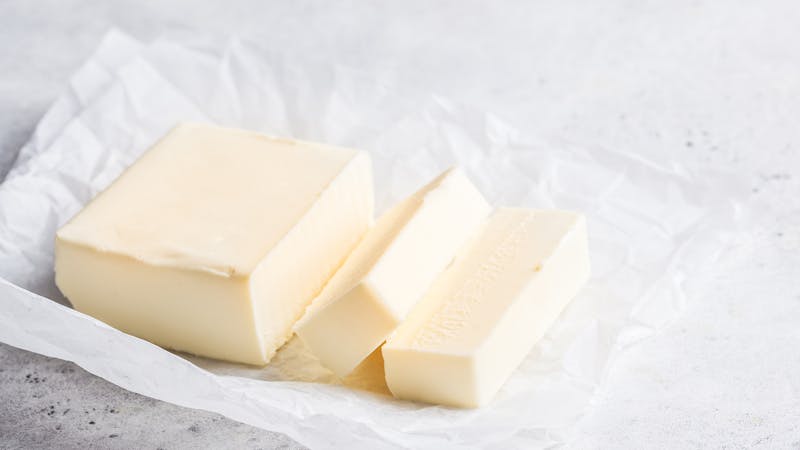



Fat clearly plays a role in low carb diets, hence the popular name: low carb, high fat (LCHF) diets. These diets have been shown to improve weight loss and blood sugar control.20
When you reduce your caloric intake by cutting from 200-300 grams of carbs down to 20 grams, it’s necessary to obtain energy elsewhere. That energy comes from fat — both the fat you eat and your body fat stores.
So, not only does replacing carbs with fat (and protein) not automatically make you fat, but it can also help you burn fat stores for energy, assuming that you eat fewer calories than you burn.
It is important to note, however, that in many low carb trials, the absolute number of fat grams consumed usually stays the same or increases very slightly. This seems counterintuitive, but consider this example:
If you are eating 40% fat on a 2,000-calorie diet, you will eat 88 grams of fat. If you go on a low carb diet with 60% fat and naturally reduce your caloric intake to 1,400 calories per day, you will be eating 93 grams of fat. That’s an absolute increase of only 5 grams per day – hardly a dramatic difference worthy of the term “high fat.”21
Nonetheless, like carbs, fat is energy that can be over-consumed, leading to a calorie surplus and weight gain.
And, let’s be honest: fat makes food taste better, which can prompt you to eat more than you initially intended.
So, when comparing fat versus carbohydrate as a source of calories, which is “better?” For many people, the answer may be fat.
Unlike carbs, fat does not directly cause an acute elevation of glucose or insulin. Because many overweight people are insulin resistant, a diet lower in carbs and higher in fat can be beneficial for improving glucose regulation.22
In addition, after a low carb adaptation period of a couple of weeks, insulin levels will likely be lower; remember that insulin promotes the storage of fat and prevents its breakdown. Therefore, a reduction in circulating insulin may allow the body to more efficiently access fat stores and burn them for energy.
But what about the long term? As long as you maintain a caloric deficit and are losing weight, or you stabilize at a healthy weight, there is no evidence that following a low carb, high fat diet worsens insulin resistance. In fact, it appears to do the opposite.23
Summary
Fat can be a part of a healthy diet that helps with weight loss and metabolic health.But, just like carbs, fat is energy that is easy to overeat.
Enjoy the fat that naturally comes with your food. Enjoy your ribeye steak or chicken thighs with skin. Sautee your veggies in butter or olive oil. Just be careful about purposefully adding extra butter, cream, or oils if they aren’t needed for enjoyment.
The best macros for your weight loss
There isn’t one best “diet” for everyone. We recommend finding a pattern of eating that is enjoyable, sustainable long-term, and that helps you lose weight in a healthy manner.
For many, the most successful dietary approach will be higher protein and lower carb. Although this is not the only method, it may be the best starting point.
Just remember, it may not matter what your macros are if you eat highly processed, low-nutrient foods, as these foods may drive you to overeat and sabotage your health progress. No matter what nutrition plan you choose, make sure you get adequate protein, adequate nutrition, and focus on high-quality, minimally processed foods.
Popular now
Carbs, protein, and fat: What are the best macros for weight loss? - the evidence
This guide is written by Dr. Bret Scher, MD and was last updated on June 19, 2025. It was medically reviewed by Dr. Michael Tamber, MD on August 5, 2022.
The guide contains scientific references. You can find these in the notes throughout the text, and click the links to read the peer-reviewed scientific papers. When appropriate we include a grading of the strength of the evidence, with a link to our policy on this. Our evidence-based guides are updated at least once per year to reflect and reference the latest science on the topic.
All our evidence-based health guides are written or reviewed by medical doctors who are experts on the topic. To stay unbiased we show no ads, sell no physical products, and take no money from the industry. We're fully funded by the people, via an optional membership. Most information at Diet Doctor is free forever.
Read more about our policies and work with evidence-based guides, nutritional controversies, our editorial team, and our medical review board.
Should you find any inaccuracy in this guide, please email andreas@dietdoctor.com.
British Journal of Nutrition 2013: Effects of high protein diets on body weight, glycaemic control, blood lipids and blood pressure in type 2 diabetes: meta-analysis of randomised controlled trials [systematic review of randomized trials; strong evidence] ↩
PLoS One 2015: Dietary intervention for overweight and obese adults: Comparison of low carbohydrate and low fat diets. A meta-analysis [strong evidence] Learn more
The British Journal of Nutrition 2016: Effects of low carbohydrate diets v. low fat diets on body weight and cardiovascular risk factors: a meta-analysis of randomised controlled trials [strong evidence] Learn more ↩
This is based on the consistent clinical experience of practitioners familiar with low carb nutrition. [weak evidence] ↩
Nutrients 2020: Ultraprocessed food: addictive, toxic, and ready for regulation [overview article; ungraded]
Current Obesity Reports 2017: Ultra-processed food intake and obesity: what really matters for health-processing or nutrient content? [overview article; ungraded]
Cell Metabolism 2019: Ultra-processed diets cause excess calorie intake and weight gain: an inpatient randomized controlled trial of ad libitum food intake [randomized trial; moderate evidence]
↩Frontiers in Nutrition 2015: Effects of high-fructose diets on central appetite signaling and cognitive function [overview article; ungraded]
American Journal of Clinical Nutrition 2004: Consumption of high-fructose corn syrup in beverages may play a role in the epidemic of obesity [overview article; ungraded]
Higher energy density foods have lower satiety effects than lower energy foods.
Journal of Nutrition 2000: Dietary determinants of energy intake and weight regulation in healthy adults [overview article; ungraded]
↩The Yale Journal of Biology and Medicine 2010: Gain weight by “going diet?” Artificial sweeteners and the neurobiology of sugar cravings [overview article; ungraded] ↩
Multiple studies show higher protein intake helps with weight loss, specifically fat mass loss. The first study reports improved body composition and weight loss with no reduction in fat-free mass or resting energy expenditure on a high protein diet in overweight women.
Nutrients 2018: Effects of adherence to a higher protein diet on weight loss, markers of health, and functional capacity in older women participating in a resistance-based exercise program [randomized trial; moderate evidence]
The following study, a 12-week intervention in obese women, also reports more significant fat mass loss with a 25% protein diet than a 15% protein diet.
British Journal of Nutrition 2020: The effect of 12 weeks of euenergetic high protein diet in regulating appetite and body composition of women with normal-weight obesity: a randomised controlled trial [randomized trial; moderate evidence]
And the next two examples also report similar results:
International Journal of Obesity Related Metabolic Disorders 2004: Effect of normal fat diets, either medium or high in protein, on body weight in overweight subjects: a randomised 1-year trial [randomized trial; moderate evidence]
Endocrine, Metabolic, and Immune Disorders of Drug Targets 2020: Effects of a low carb diet and whey proteins on anthropometric, hematochemical, and cardiovascular parameters in subjects with obesity [nonrandomized study, weak evidence] ↩
This RCT reports that those following a 27% protein diet compared to 16% had better preservation of lean mass and a better glycemic response despite no difference in weight loss.
American Jounral of Clinical Nutrition 2003: Effect of a high protein, energy-restricted diet on body composition, glycemic control, and lipid concentrations in overweight and obese hyperinsulinemic men and women [randomized trial; moderate evidence]
This randomized crossover study reports subjects with type 2 diabetes have a more significant reduction in hemoglobin A1c (HbA1c) and total daily glucose, fatty liver, and fatty pancreas with a 30% carb/30% protein diet compared to a 50% carb/17% protein diet.
Diabetologia 2019: A carbohydrate-reduced high protein diet improves HbA1c and liver fat content in weight stable participants with type 2 diabetes: a randomised controlled trial [randomized trial; moderate evidence]
This small RCT reports 100% prediabetes remission with a higher protein diet.
Nutrition, Metabolism, and Cardiovascular Diseases 2020: High protein diet leads to prediabetes remission and positive changes in incretins and cardiovascular risk factors [randomized trial; moderate evidence] ↩
American Journal of Clinical Nutrition 2008: Protein, weight management, and satiety [overview article; ungraded]
Increasing protein from 15% to 30% resulted in a significant drop in caloric intake.
American Journal of Clinical Nutrition 2005: A high protein diet induces sustained reductions in appetite, ad libitum caloric intake, and body weight despite compensatory changes in diurnal plasma leptin and ghrelin concentrations [nonrandomized study, weak evidence]
↩Obesity reviews 2005: Obesity: the protein leverage hypothesis [overview article; ungraded]
PLoS One 2011: Testing protein leverage in lean humans: a randomised controlled experimental study [randomized trial; moderate evidence] ↩
Journal of the American College of Nutrition 2004: The effects of high protein diets on thermogenesis, satiety and weight loss: a critical review [overview article; ungraded]
Nutrition and Metabolism 2004: Diet induced thermogenesis
[overview article; ungraded]American Journal of Clinical Nutrition 2000: Effect of fat-reduced diets on 24-h energy expenditure: comparisons between animal protein, vegetable protein, and carbohydrate [randomized trial; moderate evidence]
↩The following meta-analyses of randomized studies all show a benefit for low carb diets.
PLoS One 2015: Dietary intervention for overweight and obese adults: Comparison of low carbohydrate and low fat diets. A meta-analysis [strong evidence] Learn more
The British Journal of Nutrition 2016: Effects of low carbohydrate diets v. low fat diets on body weight and cardiovascular risk factors: a meta-analysis of randomised controlled trials [strong evidence] Learn more
Low carb does not just result in more weight loss than some comparison diets, it also results in more fat loss, especially when carbs are limited to 50 grams per day:
Obesity Reviews 2016: Impact of low carbohydrate diet on body composition: meta-analysis of randomized controlled studies [strong evidence] ↩
Physiology and Behavior 2012: Relatively high protein or ‘low carb’ energy-restricted diets for bodyweight loss and body weight maintenance? [randomized trial; moderate evidence] ↩
American Journal of Clinical Nutrition 2008: Effects of a high protein ketogenic diet on hunger, appetite, and weight loss in obese men feeding ad libitum [randomized trial; moderate evidence] ↩
Journal of Nutrition 2021: Diets varying in carbohydrate content differentially alter brain activity in homeostatic and reward regions in adults [randomized trial; moderate evidence] ↩
Cell Metabolism 2019: Ultra-processed diets cause excess calorie intake and weight gain: an inpatient randomized controlled trial of ad libitum food intake [randomized trial; moderate evidence] ↩
Nutrition & Diabetes 2017: Enhanced insulin sensitivity in successful, long-term weight loss maintainers compared with matched controls with no weight loss history [case control study; weak evidence]
Journal of the American College of Nutrition 2013: Improvements in glucose metabolism and insulin sensitivity with a low carbohydrate diet in obese patients with type 2 diabetes [uncontrolled study; weak evidence]
JCI Insight 2019: Dietary carbohydrate restriction improves metabolic syndrome independent of weight loss [randomized trial; moderate evidence]
Obesity 2015: Weight loss on low fat vs. low carb diets by insulin resistance status among overweight adults & adults with obesity: A randomized pilot trial [moderate evidence]
↩One example is the traditional Okinawans. They are a geographically isolated population who live on one of Japan’s southern islands and have notably high rates of people living past age 100 while eating 85% carbohydrates and 9% protein.
Age and Aging 2016: New horizons: dietary protein, ageing and the Okinawan ratio [overview article; ungraded]
While these data demonstrate it is possible to live a long life with a very high carb intake, it does not prove that carbs led to the Okinawans’ improved lifespan.
The Okinawans also ate about half as many calories as the standard Western diet. They ate local, minimally processed food and led an active, outdoor lifestyle. Perhaps their relative caloric restriction or other aspects of their healthy lifestyle were the primary drivers of their longevity, allowing them to better tolerate the high carb intake.
Biogerentology 2006: Caloric restriction and human longevity: what can we learn from the Okinawans? [nutritional epidemiology study; very weak evidence] ↩
BMJ 2018: Dietary carbohydrates: role of quality and quantity in chronic disease [overview article; ungraded] ↩
PLoS One 2015: Dietary intervention for overweight and obese adults: Comparison of low carbohydrate and low fat diets. A meta-analysis [strong evidence] Learn more
The British Journal of Nutrition 2016: Effects of low carbohydrate diets v. low fat diets on body weight and cardiovascular risk factors: a meta-analysis of randomised controlled trials [strong evidence] Learn more
Obesity Reviews 2016: Impact of low carbohydrate diet on body composition: meta-analysis of randomized controlled studies [strong evidence]
Nutrients 2020: Impact of a ketogenic diet on metabolic parameters in patients with obesity or overweight and with or without type 2 diabetes: A meta-analysis of randomized controlled trials [systematic review of randomized trials; strong evidence]
Diabetes Research and Clinical Practice 2018: Effect of dietary carbohydrate restriction on glycemic control in adults with diabetes: A systematic review and meta-analysis [strong evidence]
BMJ Open Diabetes Research and Care 2017: Systematic review and meta-analysis of dietary carbohydrate restriction in patients with type 2 diabetes [strong evidence]
The American Journal of Clinical Nutrition 2018: Effects of low carbohydrate — compared with low fat diet — interventions on metabolic control in people with type 2 diabetes: a systematic review including GRADE assessments [strong evidence]
Diabetes, Obesity & Metabolism 2019: An evidence‐based approach to developing low‐carbohydrate diets for type 2 diabetes management: a systematic review of interventions and methods [strong evidence] ↩
In the following study using a low carb diet intervention, the absolute fat grams actually went down.
PLos One 2020: Effect of a 90 g/day low carbohydrate diet on glycaemic control, small, dense low-density lipoprotein and carotid intima-media thickness in type 2 diabetic patients: An 18-month randomised controlled trial [moderate evidence]
And in this study, absolute fat grams only increased by 13 grams per day.
Nutrition & Metabolism 2008: The effect of a low carbohydrate, ketogenic diet versus a low-glycemic index diet on glycemic control in type 2 diabetes mellitus [moderate evidence]
↩Diabetes Care 1991: Plasma glucose and insulin response to macronutrients in nondiabetic and NIDDM subjects [overview article; ungraded]
Diabetes Care 2013: The effects of carbohydrate, unsaturated fat, and protein intake on measures of insulin sensitivity: results from the OmniHeart trial [randomized trial; moderate evidence]
PLos One 2020: Effect of a 90 g/day low carbohydrate diet on glycaemic control, small, dense low-density lipoprotein and carotid intima-media thickness in type 2 diabetic patients: An 18-month randomised controlled trial [moderate evidence]
Nutrients 2018: The effect of low carbohydrate diet on glycemic control in patients with type 2 diabetes [moderate evidence]
Nutrition & Diabetes 2017: Twelve-month outcomes of a randomized trial of a moderate carbohydrate versus very low carbohydrate diet in overweight adults with type 2 diabetes mellitus or prediabetes [moderate evidence]
Diabetes Care 2014: A very low carbohydrate, low–saturated fat diet for type 2 diabetes management: a randomized trial [moderate evidence]
Nutrition & Metabolism 2008: The effect of a low carbohydrate, ketogenic diet versus a low-glycemic index diet on glycemic control in type 2 diabetes mellitus [moderate evidence]
↩This is based on the consistent clinical experience of practitioners familiar with low carb nutrition. [weak evidence] ↩





